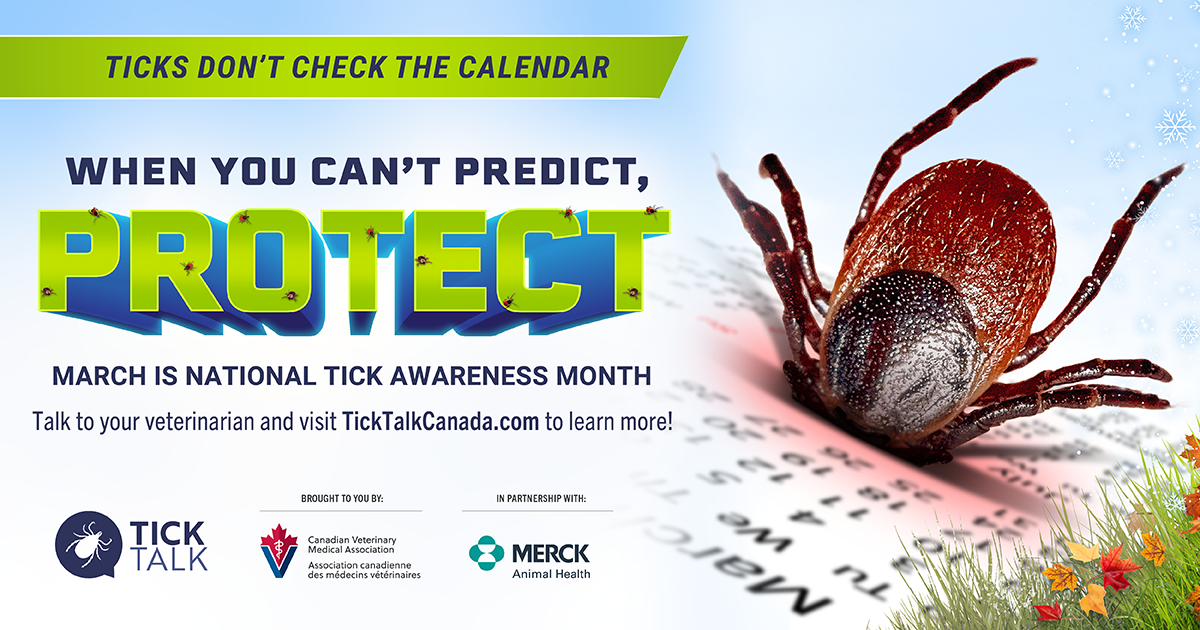
March is National Tick Awareness Month, a client-education initiative introduced in 2016 by the CVMA in partnership with Merck Animal Health.
Thanks to the enthusiastic response of the Canadian veterinary community to the campaign, a growing number of pet owners across the country are now aware of the risk of exposure to ticks year-round, and are taking measures to protect their pets and their families against these parasites and the diseases they can carry. In fact, ticks can be active every season - any day when temperatures reach 4°C and above.
The veterinary community may not be able stop tick expansion, but there's still a great deal we can do to help change public perceptions and behaviours when it comes to tick control.
2026 National Tick Awareness Month

The 2026 NTAM campaign kicks off on March 1 with this empowering message: “When You Can't Predict, Protect.”
Tick risk continues to evolve quickly, influenced by environmental factors like fluctuating temperature and weather extremes; ecological factors like tick expansion, and endemic and emerging tick-borne diseases; and social factors like pet travel and owner compliance challenges.
With all these factors at play, we can’t reliably reference last year, last month, or even last week to help us predict the risks to our patients today. It is more important than ever to protect pets for the entire risk period … but determining exactly when that is has become a challenge!
“I think we can all agree that the situation with ticks has changed dramatically in the last 10 years,” stresses CVMA president, Dr. Tracy Fisher. “And it feels like every year there are more ticks in more places, and new diseases to consider and educate clients about. We know that the Ixodes scapularis is active when temperatures are 4oC and above, but when we’re living in a climate that can’t seem to make up its mind, and ticks keep expanding their range so fast, it’s hard to accurately predict when a pet needs tick protection.”
2026 National Tick Awareness Month Tools for Veterinary Teams
Posters highlighting the possible advantages of infected ticks have been sent to veterinary clinics across the country. We are also creating new social media posts you can share on your own platforms to help inform pet parents about increased tick risks. As always, tools from previous campaigns are still available on TickTalkCanada.com.
NTAM Kick-Off Webinar
Tackling Tick Challenges in Canada
Dr. Victoria Wagner will highlight the unpredictable reality of ticks in Canada, where evolving patterns are making it increasingly difficult to anticipate risks. She will also review relevant updates on ticks and tick-borne diseases, providing practical insights to help you stay ahead in this dynamic landscape
Discover tips for successful implementation of tick control strategies with Dr. Scott Stevenson. Dr. Stevenson will explore key learnings, successful approaches, and measurable outcomes, while addressing common hurdles such as prescription barriers and the broader ONE Health implications for both pets and their owners.
This will be an excellent opportunity to build your understanding of ticks and tick-borne diseases in Canada, gain actionable strategies, and strengthen your role in protecting animal health.
2026 National Tick Awareness Month Pet-owner Engagement Tools
As in previous years, the CVMA, in partnership with Merck Animal Health, has created engaging communication materials and support tools to assist veterinary teams in their efforts to educate pet owners about ticks and tick-borne diseases.
- Video: “When You Can't Predict, Protect.”
- Printable poster
- Ready-to-use social media posts
 Related Documents
Related Documents
 Related Resources
Related Resources
| Resource | Date |
|---|---|
| Media Release: National Tick Awareness Month Hits Close to Home by Focusing on Tick Geography | 2021-03-08 |
| 0001-01-01 | |
| Protecting Pets from Lyme disease: Free Awareness Resources (Public Health Agency of Canada) | 2017-07-05 |
 Skip to main content
Skip to main content